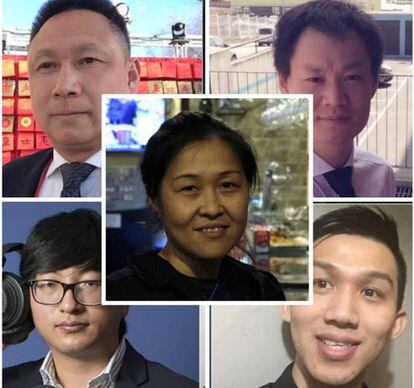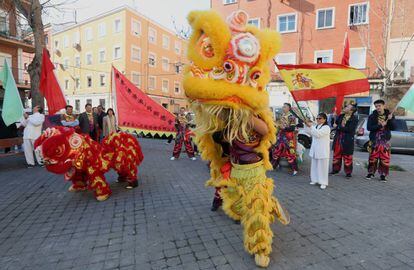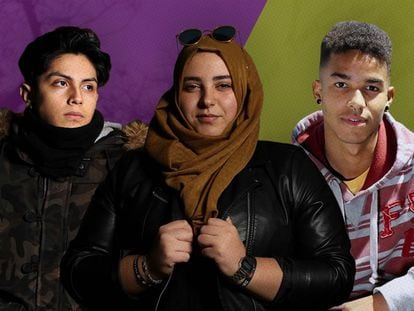The Chinese Madrileños who are fighting persisting stereotypes
As the Year of the Pig begins, members of the third-biggest foreign community in the region discuss their affinity with the people and culture of the Spanish capital

The Chinese province of Zhejiang is riding an economic high. Situated in the east of the country, its GDP grew by 7.1% last year, and it is the fourth-biggest contributor to the country’s public coffers, as its governor Yuan Jiajun pointed out in his annual report.
It was not always this way. Last century, before the Zhejiang economy was dominated by the digital sector, the area was famous for the production of silk, an industry that failed to provide jobs for all. In the 1970s, many locals packed their bags and headed for Madrid in search of a better life. Now, their children view China as a distant land.
I still have my Chinese nationality . I don’t want to lose my roots Sen Lin, 35
“I only lived in China for three years, between the ages of three and six,” says Jorge Chen, 31, who runs his own bar and rejects the insinuation that his community keeps to itself. “I’ve never considered going back. Most of my generation thinks of China as our parents’ country. I feel more Spanish than Chinese and I identify more with the people here, in fact. It’s true that we can be a bit more reserved or suspicious at first, but afterwards we get very familiar.”
Jorge’s parents and many of the older generation did keep to themselves when they arrived in Madrid, however, and it is hard to find a Chinese person over 40 frequenting the same bars as their Spanish counterparts. But this is not unusual; the first migrants to come from another country tend to stick together, finding strength in numbers to confront, among other things, the inevitable prejudice toward new arrivals.
The Madrid region’s Chinese community is growing at a steady clip. In the last 10 years, it has almost doubled. More specifically, it has gone from 33,489 in 2008 to 59,757 in 2018, according to the Spanish Statistics Office. And while the language barrier has kept the first generation on the fringes of Spanish society, this does not apply to the younger generation, though some of prejudices from the past have stuck.
“We get labeled a lot,” says one young man who prefers to remain anonymous. “They say we don’t pay taxes and there are expressions that the Chinese community itself uses, which it shouldn’t because they are racist; things like, ‘He cheated me like a chino,’ or ‘He works like a chino’.”

The city of Madrid has 38,547 Chinese residents, according to official statistics. A quarter of the community has settled in the Usera district, where tradition still rules. “They have made a Chinatown down there, an insular community that doesn’t need to mix or integrate,” says Jorge Chen. “The Chinese in Usera have turned it into a home away from home, so there’s no need to adapt.”
Marisa Wang, whose parents own a supermarket in central Madrid, is another member of the younger generation who has, to a great extent, moved away from the traditions and customs of “the old country.” At 27, she feels deeply Madrileña, speaks with a pronounced Madrid accent, and is considering taking civil servant examinations.
“My dream was to make videos for the advertising industry, but the situation in this country is not good for risky ventures,” she says. “My parents came here because China was like the third world. But now it’s the strongest economy in the world while Spain has been in crisis for I don’t know how many years.”
And while Marisa is not sure who to vote for, she is clear what her politics are. “I’ve always been on the left,” she says. “Podemos inspired a lot of hope, but I think many young people on the left feel betrayed.”
We get labeled a lot. They say we don’t pay taxes and there are expressions that the Chinese community itself uses, which it shouldn’t because they are racist
Anonymous
She also has clear ideas about Catalonia – “Nationalism is dangerous,” as is racism and the far right. “Sometimes I’m afraid it could surface in some parts of Spain,” she says.
Marisa was planning to go to Usera to celebrate the Chinese New Year – the Year of the Pig. The festivities include a traditional parade along the streets with members of the community dancing traditional dances dressed as dragons and lions among legions of paper lanterns. Rehearsals for the event were directed in Chinese by the president of the Cantonese Association of Macao and Hong Kong, Haibien Luo.
Luo has spent the last 20 years living in Madrid, but he still struggles with the language, as do many in the area. “We didn’t use to speak much and only mixed with our own people,” explains the general secretary of the Association of Quingtianes, Xiao Hai Zhu, 51, in halting Spanish. “The young people – our children – go to school and can mix more.”
Antonio Liu Yang, who was also involved in the New Year festivities, believes Chinese parents are extremely proud of the fact that their children speak Spanish. “But it is important that they don’t forget their roots,” he says.
Meanwhile, Sen Lin, 35, thinks it is a shame that his generation is disowning their country’s traditions. “We no longer celebrate the New Year as much,” he says. “And it seems a pity. These traditions are only kept by the Chinese who live in districts such as Usera. I still have my Chinese nationality, as having a residence card is the same [as having Spanish nationality]. I don’t want to lose my roots.”
Most of my generation thinks of China as our parents’ country. I feel more Spanish than Chinese Jorge Chen, bar owner
“There are huge cultural differences,” says film director and audiovisual artist Yu Depeng, whose film Perro Callejero (or, Stray Dog) – will be showing from February 15 until March 3 at the Naves Matadero cultural center in Madrid. His is a hybrid project about the Chinese community in the Spanish capital, combining video art with experimental cinema to shed light on “the unknown Chinese community of Madrid.”
So with such a social chasm, why settle in Madrid? Dawei Ding, founder and director of the radio station China FM – the first European station to broadcast in Mandarin 24/7 – explains: “It’s perfect. Good climate, good food and the kind of welcome you don’t find elsewhere. Madrileños are the most tolerant people I’ve ever come across.”
Eva Yin, a waitress who has spent 17 years in the capital, agrees. “I have a good life here,” she says. “I have a load of Spanish friends and at the moment I am not planning to go back. But it’s also true that I wouldn’t go and live somewhere that wasn’t Madrid. I am not Chiñola [a mix of Chinese and Spanish]: I am Chinese and Madrileña.”
English version by Heather Galloway.












































